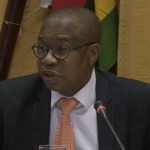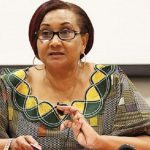“One thing we wanted to target was excessive demand for luxury goods. Our approach there was not to increase tariffs on them – we didn’t increase taxes and import duties – but said perhaps one way to tackle this is to make sure you meet the import duties in the currency in which you acquired the goods in the first place,” Ncube said.
“Of course I’m quite aware that there have been questions like: ‘Oh, where do we get the foreign currency from?’ You don’t pay duty before you buy the goods, so you must have the foreign currency to buy the goods in the first place, so the question then becomes moot.”
Zimbabwe has spent more than $4 billion on vehicle imports since dollarisation in 2009.
Ncube expects the cost containment measures in the budget, which include turning over agriculture spending to banks and industrial corporations directly dependent on farm produce, to complement a 2% tax on electronic payments he introduced in October, towards narrowing the budget deficit.
Addressing criticism that he had not tackled Zimbabwe’s currency crisis, Ncube said he was targeting the twin fiscal and current account deficits as a first step towards currency reforms.
“The value of a currency is driven by fundamentals. The first and most important fundamental is the budget deficit. The other driver of a currency is obviously inflation, the inflation differential between Zimbabwe and its neighbours,” Ncube said.
“We saw that blip or jump in inflation in October, but our expectation is that inflation will fall on a month-on-month basis, going forward because that jump was one-off and now we had the adjustment and now progress once we’ve done that structural adjustment upwards in the trajectory, so it should drop in the month of November, December going forward. So, again, we won’t have any pressure from that inflation differential going forward.”
Ncube said the move to charge import duty in forex on some goods is expected to push import demand down.
“Such demand is what is driving the current account deficit. All of this, put together, will go a long way in stabilising the currency and set the stage for a roadmap towards currency reform,” the Finance Minister said.
“So everything we’re doing in the budget is linked to the entire currency reform agenda. Because you have to do it in steps, you can only do currency reforms when your fundamentals are strong, when your budget deficit is under control. That’s the first order of business.”- NewZwire
(241 VIEWS)


